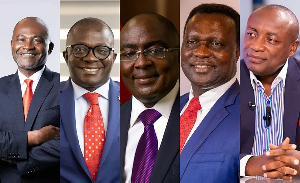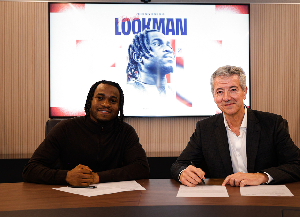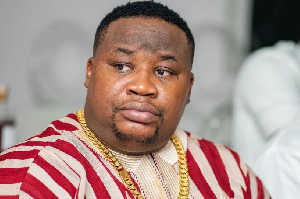Pettiness and Polarisation in Ghana
By Kwesi Atta Sakyi
4th June 2013
Machiavelli in his book, The Prince, stated that power is like a net which catches all kinds of fish, and it is the ultimate thing to seek. Power is about influence and the influential (cf. Laski & Laswell). There was a time in Africa when plural politics was an endangered species, as many dictators monopolised power under the post-independence era of the one party socialist regimes. Some of the politicians overstayed their welcome as if they were the only repositories of wisdom.
Truly speaking, what does a leader expect his country to be like if he stays in power for upwards of three or four decades? Such sit-tight African dictators remind one of the Kweku Ananses, Kweku Tsens and Kweku Donsuros of this world, as they make governance in Africa look like a fairy tale. What with the Gadaffis, Mobutus, Bokassas, Abachas, Musevenis and Mugabes of this world.
Those sit-tight African presidents subjected their citizens to gruesome acts of incivilities such as torture, unlawful arrests and imprisonment, curtailment of the individual freedoms of speech, association, and other unconstitutional acts. Lord Acton once averred that power corrupts and absolute power corrupts absolutely. We all know how some of those-sit-tight African dictators bankrupted their economies by spiriting off hard-won taxpayers’ monies into their personal accounts overseas, throwing lavish parties, buying palatial mansions overseas, buying themselves private jets and limousines, among others.
Others resorted to empowering their cronies, sons and daughters, party cadres and loyal tribesmen and followers, to entrench themselves in power. Those sit-tight African leaders played the tribal card by surrounding themselves with tribesmen, to the exclusion of well qualified citizens from other tribes.
It is a pity that even though this year 2013, the African Union (AU) has celebrated 50 years of the coming of age of Africans, yet in a pioneer country such as Ghana, we have a sordid spectacle of a politics of insults, lies, villification and greed raging in our dear country. The modern breed of most of our politicians have resorted to self interest rather than serving the larger national interest of their people.
Our pioneer leaders, who fought for independence in Africa, such as the Nkrumahs, Nyereres, Nassers, Kaundas, Modibo Keitas, Sekou Toures, Ben Bellas, Azikiwes, among others, displayed exemplary leadership of sacrifice, selflessness, altruism, and foresight. Of course, they were no saints or angels. They did what they did because of the prevailing geopolitical circumstances such as the Cold War, and the trying moments of emancipating the black man globally. They used state funds to support and execute liberation wars in other African Countries. They offered sanctuary to political refugees from other countries. They relentless championed the cause of African unity.
In the early 1970s, our late former military leader, Ignatius Kutu Akyeampong, proposed Union Government or UNIGOV for Ghana, and his seminal idea was pooh-poohed as it did not see the light of day. I remember that I wrote to the Castle to submit my proposals on UNIGOV, and my submission was duly acknowledged by a letter which thanked me for sharing my ideas. I think it is high time we revisited the concept of UNIGOV from another perspective. We have to take plural partisan politics in Ghana in particular, and Africa in general, to another level, by taking radical measures to stem the tide of polarisation caused by unbridled politics of stomach-direction, or ‘the winner takes all, the loser stands small’, (courtesy of Abba’s song in the 60s) syndrome.
What prevents us from forming union governments in Africa devoid of partisan politics of insults, acrimony, divisiveness and bitterness? Why cannot the African Union look into the possibility of evolving new forms of political systems in Africa which are non-partisan, but rather based on broad interest groups and coalitions? Events in Kenya, Rwanda, Ivory Coast and elsewhere, inform us to reflect seriously along the lines of a paradigm shift in African politics. This should be part of the African renaissance and NEPAD. Trade Unions, traditional chiefs, the military and police, churches and religious groups, professional associations, among others, will be represented in our parliaments and national assemblies under proportional representation, along the lines of the Swedish model.
Plato of old once said that the measure of a man is how he behaves when he acquires power. There are many people today in Africa who do not know much about the nitty-gritty of power, yet they aspire to become leaders. The Greeks had a mythology of a headless god, who because he was headless, went about chopping off people’s heads out of envy. That is what is happening in Africa when power gets into the hands of wrong people. We have a situation in Africa today whereby many of the people who acquire power are crooks, liars, conmen and people of immoral character. Power is being raped in Africa as pluralism has given rise to an unhealthy rivalry and a syndrome of destructive politics.
In the advanced countries, politics is perceived as a career, and people prepare themselves adequately well by going through the ranks to acquire quality education, to learn the ropes through serving in various capacities in the hierarchy, in the local government and civil service. What do we see in Ghana today? Some of our leaders have acquired education which cannot be said to be quality, because our educational standards took a nosedive in the mid 80s when our leaders sold our birthright in exchange for a system of education whose products are nothing to write home about. Some of our leaders today have come from this decrepit and lowbrow educational system, and all they know is to shout insults from the rooftops, and throw insults at each other, instead of engaging in reasoned arguments, backed by knowledge, wisdom and insight.
In Ghana today, we have the Nkrumah legacy, which has become moribund, derelict and dinosauric. We also have a stump of the Danquah-Dombo-Matemeho legacy, which was notorious for its politics of violence, deceit, and separatism. Nkrumah’s legacy was symptomatic of eleemosynary economics or state largesse, whereby the national budget was always out of balance, because of trying to roll out free education, free medical care, among others. At least, it was better because we had redistribution of the national cake and empowerment of the people, as well as providing a vehicle through free education, for rapid social upward mobility of the poor. Our middle income group in Ghana today, which is growing by leaps and bounds, is partially and largely credited to that.
Part of Nkrumah’s legacy was the promotion of national unity through the boarding school system in the secondary schools, teacher training colleges, and technical schools in those halcyon days. Much as one would appreciate the decentralisation of our secondary schools by confining students to apply to schools near their locale for purposes of economic expediency, one would also note that this has not helped matters of national integration. Our current poisoning of the political chalice by playing the tribal card is because we fail to appreciate the nitty-gritty of the need for political engineering in the art of nation building. The sooner we returned with alacrity to the boarding school system, the better it would augur well for our national unity and detribalization of our body polity.
Currently, some of our journalists and people in the media are mostly products from our current failed educational system, and all they know is to get bribes from politicians and allow them airtime to spew their garbage, twist facts and mislead the gullible Ghanaian public with lies upon lies. Instead of carrying out investigative and developmental journalism or communication for development, they are following the failed politicians in a stomach-direction, low-brow gutter and yellow journalism. What does the National Media Council (NMC) say to this?
We have so-called think-tanks in Ghana such as IMANI, Danquah Institute, Centre for Policy Studies, among others being led by partisan and vociferous and clueless people who make the wrong noises because, in the first place, they are themselves like blind men leading other blind men along blind alleys. They are simply not objective as one can discern strong tones of partisanship in their vociferous altercations. Our country, Ghana, has descended into an abyss of utter shame and gloom. Today, the people with power in Ghana do not care two hoots what happens to the man in the street, who sees no light at the end of the tunnel because of massive corruption, unemployment or the spiralling wage-price inflation.
Instead of planning for the future welfare of our people, our parliamentarians and leaders are busy battling to earn their per diem, fat salaries and perquisites of car and housing loans. Where is the developmental agenda? Where is the hunger in them to fast track development? Do we need a seismic paradigmatic shift from partisan politics to a UNIGOV type of government, or what I call, a professionalised political dispensation, where only professionals are allowed political space to operate in the political arena? Who are these professionals?
Anyone such as a doctor, engineer, architect, lawyer, accountant, lecturer, among others, who has a practising licence, to abide by the tenets and guidelines of his or her profession. We will need to amend our constitution to confine politics to only seasoned professionals who have a minimum of experience from practising. We need to ban discussion of political issues on our radios and TVs. We need to encourage our radio and TV stations to disallow phon -in pogrammes which spark unhealthy political debates and cacophonous din. Most serial callers are clueless about the issues they emotionally and sensationally try to champion out of fanaticism and abject ignorance.
In this advanced age of space science, it is unfortunate that we are still practising rudimentary grassroots participatory democracy in Ghana, which the Greeks long ago had practised at their Agora (market place) in the 4th and 5th centuries before the Christian era. Let us leave political discussions and policy issues to our seasoned and elected political elite, for that is the essence of representative democracy. Alternatively, let us have a Union Government, to give voice to a representative cross section of the populace to avoid the current sorry state of power capture by some greedy and ignoramus and obscurantist politicians.
Policies are not made by the people but by the elected elite, or else we have anarchy. We can allow the internet in Ghana to function under strict surveillance. We do not need a police state, but we do need desperately, law and order in this Ghanaian political jungle and morass. (cf. Hobbes). The only way to stop the current dangerous trend of the polarisation of our political dispensation, is to take some drastic measures, which should exclude giving rise to the rise of people’s power like the Arab Spring. We can follow the following recommendations:-
1. Heavily regulate and monitor the media houses, by imposing heavy fines on them or withdrawal of their licence if they do not tow the line.
2. Go back to the old system of boarding houses in our secondary schools, for purposes of national integration.
3. Set up a national political leadership centre to orientate our MPs and political party leaders, through induction training.
4. Ban all forms of political discussion on radio and TV, except designated press and media briefings or conferences.
5. Scrap our current educational system and go back to the old British system of 17 years of primary and middle school education.
6. Throw overboard, all those political baggage from the Nkrumah, Danquah- Dombo and Rawlings legacies, so that we start afresh with professionalised political parties, formed and led by the lawyers, TUCs, GNAT, among others.
7. In a bid to have a union government, we should have a bicameral legislature, whereby the upper house will be made up of our retired army generals and service chiefs, civil servants and paramount chiefs. The lower house should also have proportional seats reserved for all political parties and professional associations, NGOs and churches. We can follow the Swedish model.
8. Our Council of State should automatically admit past presidents as de facto members.
9. No political party in Ghana should be registered in Ghana if it did not reflect a national character of having membership from across the 10 regions of Ghana.
10. Political party registration should be made very demanding, such as initial registration fee to be put at say 10 million cedis, and annual licence renewal fee be pegged at 1 million cedis.
In conclusion, I call upon a major review of our constitution, for us to move away from polarised partisan politics of insults and winner -takes- all to one of a professionalised polity. Since power is a zero sum game, and it has the tendency to be abused, we will need a lot of checks and balances in our political system to constrain those who have the proclivity to abuse it. Be it referent power, technological power, power derived from wealth, hereditary power, legitimate or illegimate power, coercive power, among others, the bottom line is that state power in Ghana needs to be caged from running riot, and being abused by a few individuals who wield and use it irresponsibly.
We need interventions to ensure that raw power of state is utilised in a refined manner, and it is exercised by people of civil and noble intentions. To achieve that, we have to re-order and re-arrange our constitution and our current chaotic political party system. We need to seek visionary, honest and patriotic leaders who will put the broad interests of the nation first, and their personal comfort last. Until that time, we shall continue having politics of insults and retrogression in our national development. The on- going election petition case in Ghana is seriously side- tracking development. Let us hope we have a speedy verdict that resolves this cataclysm and imbroglio.
Contact: kwesiattasakyi449@gmail.com
Opinions of Friday, 7 June 2013
Columnist: Sakyi, Kwesi Atta














